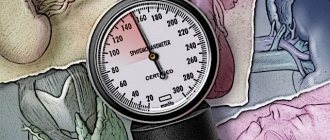Pharmacodynamics and pharmacokinetics
Co-Perineva is a combination drug containing perindopril and indapamide .
The drug has an antihypertensive effect, the effectiveness of which does not depend on the patient’s age, body position, and is not accompanied by tachycardia. Does not affect lipid metabolism, including in patients with diabetes . When taking the drug, the risk of hypokalemia .
The antihypertensive effect persists throughout the day.
After just a month of taking the drug, a decrease in blood pressure is achieved. If treatment is stopped, there is no risk of withdrawal syndrome .
Perindopril is extremely effective in the fight against arterial hypertension (all forms of severity). 4-6 hours after taking the medicine, the maximum antihypertensive effect develops, which lasts throughout the day.
Perindopril after administration is quickly absorbed from the gastrointestinal tract. Bioavailability is 65-70%. 3-4 hours after administration, the maximum level of the drug in the blood plasma is reached. It is metabolized in the liver, forming an active ( perindoprilat ) and five inactive metabolites. A small amount of perindoprilate passes into breast milk and through the placenta. Excreted through the kidneys.
The elimination of perindoprilate is slowed down in patients with heart and renal failure and patients over 65 years of age. In patients suffering from liver cirrhosis, hepatic clearance is reduced by half, however, the level of perindoprilate is not reduced.
Indapamide is almost completely absorbed from the gastrointestinal tract; simultaneous intake of food can slow down this process. After an hour, the maximum level in the blood is reached. Metabolized in the liver. Excreted through the kidneys and intestines.
When to take the drug, after how long
To reduce blood pressure, wait until there is no ethanol in the body. It should not be in the bloodstream, gastrointestinal tract, liver, kidneys, or central nervous system. If a person has taken a single dose of alcohol, wait no more than 1 day from the end of the hangover.
If you drink alcohol frequently, it is recommended to wait at least 5-7 days for ethyl alcohol to be removed from the tissues. Alcoholism is a contraindication for taking the drug. A person must undergo addiction treatment before taking the drug.
Contraindications
The drug Co-Perineva is contraindicated in the following cases:
- sensitivity to any element of the drug;
- lactose intolerance;
- refractory hyperkalemia;
- angioedema;
- bilateral renal artery stenosis;
- lactase deficiency;
- liver failure;
- glucose-galactose malabsorption;
- renal failure;
- renal artery stenosis;
- pregnancy, lactation, children under 18 years of age.
You should take the drug with caution in the following cases:
- connective tissue diseases ( scleroderma , SLE );
- immunosuppressant therapy;
- inhibition of bone marrow hematopoiesis;
- angina pectoris;
- renovascular hypertension;
- decrease in blood volume;
- hyperuricemia;
- diabetes;
- cerebrovascular diseases.
Side effects
The use of the drug may cause the following side effects:
- thrombocytopenia , agranulocytosis , hemolytic anemia , leukopenia , aplastic anemia ;
- vertigo , paresthesia , dizziness, headache; unstable mood, sleep disturbance; in rare cases – confusion;
- tinnitus, blurred vision;
- orthostatic hypotension , arrhythmias ( bradycardia , atrial fibrillation , ventricular tachycardia ), myocardial infarction , angina pectoris ;
- dry cough , shortness of breath , bronchospasm, rhinitis , eosinophilic pneumonia ;
- dry mouth, constipation, nausea, abdominal pain, loss of appetite, epigastric pain, vomiting, diarrhea, dyspepsia, pancreatitis , jaundice ;
- angioedema (face, lips, limbs, here, tongue, larynx), rash, urticaria , itching;
- muscle spasms;
- renal failure;
- impotence;
- asthenia , increased sweating.
Instructions for use (Method and dosage)
The medicine Co-Perineva is taken 1 time per day, orally, in the morning before breakfast, with water.
Doses are listed in the indapamine/perindopril ratio.
To begin with, you should take one tablet per day (0.625/2 mg). If it is not possible to achieve blood pressure control within a month, the dose is increased to one tablet (1.25/4 mg). To achieve the most pronounced effect, you should increase the daily dose to the limit - one tablet (2.5/8 mg).
For elderly patients, the initial dose is one tablet (0.625/2 mg). Treatment with the drug can be prescribed in case of control of blood pressure and kidney function.
Patients with moderate renal impairment are started on the lowest dose, with the maximum allowed dose being 1.25/4 mg.
Compound
| Pills | 1 table |
| composition based on 1 table. listed in the table |
| Active ingredients | Tablet dosage, mg | ||
| 0,625 + 2 | 1,25 + 4 | 2,5 + 8 | |
| Indapamide | 0,625 | 1,25 | 2,5 |
| perindopril erbumine K semi-finished granules | 37,515 | 75.030 mg | 150,06 |
| Active substance of the semi-finished granule product | |||
| Perindopril erbumine | 2 | 4 | 8 |
| Excipients for semi-finished granules | |||
| calcium chloride hexahydrate | 0,6 | 1,2 | 2,4 |
| lactose monohydrate | 30,915 | 61,83 | 123,66 |
| crospovidone | 4 | 8 | 16 |
| Excipients | |||
| MCC | 11,25 | 22,5 | 45 |
| sodium bicarbonate | 0,25 | 0,5 | 1 |
| colloidal silicon dioxide | 0,135 | 0,27 | 0,54 |
| magnesium stearate | 0,225 | 0,45 | 0,9 |
Overdose
Symptoms of overdose: vomiting , nausea, muscle cramps, drowsiness , dizziness, confusion, decreased water and electrolyte balance, oliguria , significant decrease in blood pressure.
If the above symptoms appear, you should rinse your stomach, then take activated charcoal to restore the water and electrolyte balance. If the pressure decreases significantly, the patient should lie on his back and raise his legs, then inject a 0.9% sodium chloride solution.
Interaction
You should not combine the drug Co-Perineva with ACE inhibitors and lithium preparations , as the level of lithium in the blood may increase. If co-administration is necessary, lithium levels should be monitored.
Use extreme caution when taking baclofen , which may increase the hypotensive effect. Blood pressure and kidney function should be monitored and the dose adjusted if necessary.
Neuroleptics and tricyclic antidepressants enhance the effect of hypotension and increase the likelihood of orthostatic hypotension.
Tetracosactitol and GCS help reduce the hypotensive effect.
When taken simultaneously with any other antihypertensive drugs, there is a possibility of a stronger manifestation of the hypotensive effect.
Perindopril
At the same time, it is not recommended to use it with potassium-sparing diuretics ( Spironolactone , amiloride , eplerenone , triamterene ) and potassium supplements . When used in parallel, the level of potassium in the blood may increase, which can lead to death. If joint therapy is necessary (for hypokalemia), it is necessary to monitor potassium levels and ECG parameters.
It is recommended to take Co-Perineva together with insulin and hypoglycemic agents . leukopenia increases when used with cytostatic immunosuppressants , allopurinol , corticosteroids and procainamide . When used with general anesthesia agents, their hypotensive effect may increase. When used in high doses, thiazide and loop diuretics can lead to hypovolemia .
Indapamide
Drugs that cause ari must be taken with caution, since there is a possibility of developing hypokalemia . It is recommended to take Indapamide with caution with medications such as antipsychotics ( cyamemazine , trifluoperazine , chlopromazine , etc.), antiarrhythmic drugs ( amiodarone , hydroquinidine , ibutilide , tosilade etc.), benzamides ( sultopride , tiapride , sulpiride , amisulpride ), buterophenones ( haloperidol , droperidol ), other drugs ( astemizole , mizolastine , sparfloxacin , methadone , bepridil , halofantrine , terfenadine , cisapride ).
Medicines that can cause hypokalemia : tetracosactide , laxatives that stimulate intestinal motility, amphotericin B , glucocorticoids , mineralocorticoids , cardiac glycosides .
lactic acidosis increases when used with Metformin . Patients taking high-dose iodine contrast agents are at risk of kidney failure. Hypercalcemia can develop when taking medications containing calcium salts.
When can you drink alcohol if you are taking or have taken the drug?
The possibility of drinking alcoholic beverages depends on the patient’s diagnosis. If therapy has completed, but he is at risk for internal hemorrhage in organs or hypertensive crisis, the doctor gives a complete ban on drinking drinks containing ethyl alcohol.
If there are no serious risks, you can drink small doses of alcohol after finishing taking the drug.
Wait 2-3 weeks. To obtain permission, contact your doctor. Only he decides how long after you can drink alcohol.
special instructions
It is not recommended to take it in parallel with lithium preparations .
Therapy is strictly contraindicated in patients with impaired renal function . Patients suffering from hypertension may experience symptoms of renal failure . In this case, you should stop treatment with Co-Perineva. Later, therapy can be repeated, prescribing minimal doses, or indapamide and perindopril can be used in monotherapy. These patients should have their blood creatinine and potassium
The combination of Indapamide and Perindopril cannot prevent the development of hypokalemia , especially in cases where the patient has diabetes mellitus or renal failure. In this case, the level of potassium in the blood must be monitored regularly.
Organs affected by the toxin
The combined use of pharmacological agents and alcohol has a toxic effect on the internal organs and environments of the body. Alcohol, entering into a chemical reaction with a medicine, leads to poisoning, disrupts physiological processes, enhances or weakens the healing properties of drugs.
The liver suffers more than other organs. She gets hit twice. Many medications have a side effect - hepatotoxicity, destroy cells, and disrupt the physiology of the organ. In the liver, alcohol breaks down to ethanal, a substance 20-30 times more toxic than ethanol, which causes the death of hepatocytes.
Dangerous groups of drugs for the organ in combination with alcohol:
- anti-inflammatory;
- hormonal;
- antibacterial;
- antifungal;
- glucose control agents for diabetes mellitus;
- anti-tuberculosis;
- cytostatics (chemotherapy drugs);
- tranquilizers (anti-epileptic, psychotropic).
In second place among the internal organs exposed to the harmful effects of alcohol together with medications are the heart and vascular system. Strong drinks during drug therapy constrict blood vessels and increase blood pressure. The simultaneous intake of alcohol and chemical substances leads to failure of the myocardium and increases the risk of developing an attack of angina pectoris and a heart attack.
A mixture of ethanol and pharmaceuticals disrupts the quality of the blood and reduces clotting. This is dangerous due to internal bleeding and strokes.
Ko-Perineva price, where to buy
The cost of the drug in Russia on average is about 350 rubles per package of 30 pieces. and 900 rubles for 90 pcs. packaged. Average price in Ukraine for a package of 30 pcs. – 205 UAH, per package 90 pcs. – 400 UAH.
- Online pharmacies in RussiaRussia
ZdravCity
- KO-Perineva tablets 4mg+1.25mg 30 pcs. Krka-Rus LLC
535 rub. order - KO-Perineva tablets 8mg+2.5mg 30 pcs. Krka-Rus LLC
RUR 555 order
- KO-Perineva tablets 2mg+0.625mg 30 pcs. Krka-Rus LLC
280 rub. order
- KO-Perineva tablets 4mg+1.25mg 90 pcs. Krka-Rus LLC
RUB 878 order
- KO-Perineva tablets 8mg+2.5mg 90 pcs. Krka-Rus LLC
RUB 1,041 order










